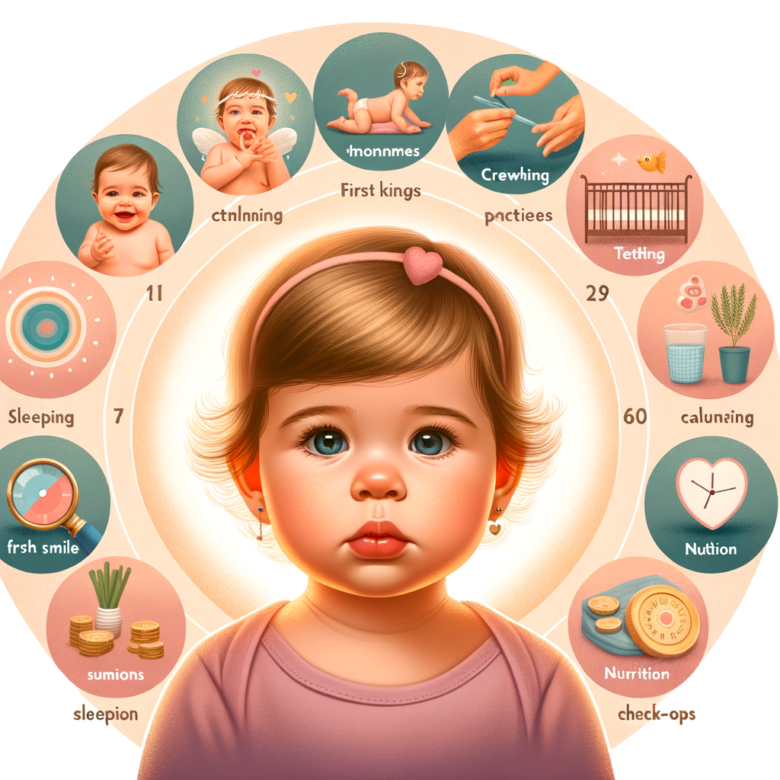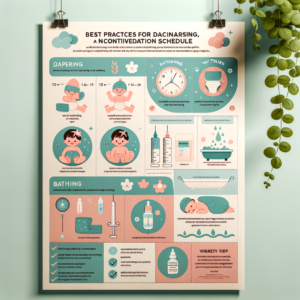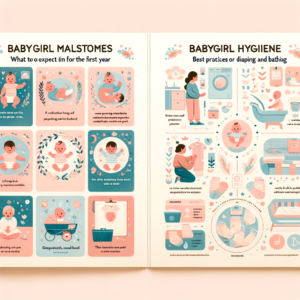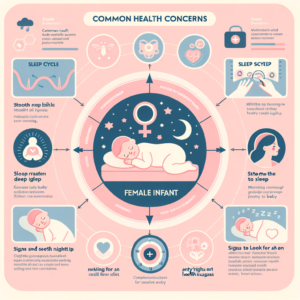The first year of your babygirl’s life is filled with remarkable changes and exciting developments. From her first smile to her first steps, each milestone is a cause for celebration. This comprehensive guide will walk you through the key developmental milestones you can expect in your babygirl’s first year, helping you track her progress and know when to seek professional advice.
Understanding Developmental Milestones
Before we dive into specific milestones, it’s important to note:
- Every baby develops at their own pace
- Milestones are general guidelines, not strict rules
- Premature babies may reach milestones later than full-term babies
- Always consult your pediatrician if you have concerns about your baby’s development
First Month Milestones
During the first month, your babygirl is adjusting to life outside the womb.
Physical Development:
- Moves arms and legs in jerky motions
- Turns head from side to side when lying on back
- Focuses on objects 8-12 inches away
Cognitive Development:
- Recognizes some sounds, including parents’ voices
- Sees black and white patterns or high-contrast colors
Social and Emotional Development:
- Begins to develop a social smile
- May calm down when held or spoken to
2-3 Months Milestones
Your babygirl is becoming more alert and responsive.
Physical Development:
- Holds head up when on tummy
- Follows moving objects with eyes
- Opens and closes hands
Cognitive Development:
- Recognizes familiar faces and objects
- Begins to develop hand-eye coordination
Social and Emotional Development:
- Smiles in response to others
- Coos and makes gurgling sounds
4-6 Months Milestones
This period marks significant growth in motor skills and awareness.
Physical Development:
- Rolls over (first from tummy to back, then back to tummy)
- Sits with support and eventually without support
- Reaches for and grasps objects
Cognitive Development:
- Responds to own name
- Shows curiosity about objects, trying to grab things out of reach
Social and Emotional Development:
- Laughs out loud
- Enjoys playing with others, especially parents
7-9 Months Milestones
Your babygirl is becoming more mobile and expressive.
Physical Development:
- Sits without support
- Starts crawling
- May pull to stand
Cognitive Development:
- Understands object permanence (objects exist even when out of sight)
- Explores objects in different ways (shaking, banging, throwing)
Social and Emotional Development:
- Develops stranger anxiety
- Uses voice to express joy and displeasure
- Responds to “no”
10-12 Months Milestones
The last quarter of the first year brings exciting developments in mobility and communication.
Physical Development:
- Cruises along furniture
- May take first steps
- Uses pincer grasp (thumb and forefinger)
Cognitive Development:
- Follows simple directions
- Says “mama” and “dada” with meaning
- Imitates gestures and some simple words
Social and Emotional Development:
- Shows affection to familiar people
- Plays simple games like peek-a-boo
- May become clingy with parents
Language Development Throughout the First Year
Language skills develop rapidly in the first year:
| – 0-3 months: Coos and gurgles |
|---|
- 4-6 months: Babbles and makes sing-song sounds
- 7-9 months: Begins to imitate sounds; babbling has both long and short groups of sounds
- 10-12 months: Says “mama” and “dada”; may use other simple words
Red Flags: When to Consult Your Pediatrician
While all babies develop differently, certain signs may indicate a need for professional evaluation:
- Doesn’t respond to loud sounds
- Doesn’t follow moving objects with eyes by 2-3 months
- Doesn’t smile at people by 3 months
- Can’t support head well by 4 months
- Doesn’t reach for and grasp objects by 3-4 months
- Doesn’t try to get objects that are out of reach by 6-7 months
- Shows no affection for caregivers by 6-8 months
- Doesn’t sit with help by 9 months
- Doesn’t babble by 12 months
- Doesn’t use gestures like waving or shaking head by 12 months
Encouraging Your Babygirl’s Development
You can support your babygirl’s development through:
- Tummy Time: Promotes strength and motor skills
- Reading: Enhances language development and bonding
- Playtime: Offers sensory experiences and learning opportunities
- Responsive Caregiving: Builds trust and emotional development
- Singing and Talking: Supports language skills and cognitive development
Frequently Asked Questions
Q: Should I be concerned if my babygirl isn’t crawling by 9 months? A: Not necessarily. Some babies skip crawling altogether and move straight to walking. However, if you’re concerned, consult your pediatrician.
Q: How can I help my babygirl learn to talk? A: Talk to her frequently, read books together, sing songs, and respond to her attempts at communication.
Q: Is it normal for my babygirl to prefer one parent over the other? A: Yes, this is normal and usually temporary. Continue to offer love and attention from both parents.
Q: When should my babygirl start walking? A: Most babies take their first steps between 9 and 18 months, with 12 months being average.
Q: How can I make sure my babygirl is meeting all her milestones? A: Regular check-ups with your pediatrician will help track your baby’s progress. At home, provide a stimulating environment and plenty of love and attention.
Conclusion
Your babygirl’s first year is a time of incredible growth and development. Remember that each baby is unique and will reach milestones at her own pace. The ranges provided are general guidelines, and slight variations are usually nothing to worry about.
Celebrate each milestone as it comes, but don’t stress if your babygirl seems a bit ahead or behind in certain areas. The most important things you can provide are love, attention, and a nurturing environment.
If you have any concerns about your babygirl’s development, don’t hesitate to speak with your pediatrician. They can provide personalized advice and, if necessary, refer you to specialists for further evaluation.
Enjoy this magical first year with your babygirl. Before you know it, she’ll be running, talking, and embarking on new adventures!



